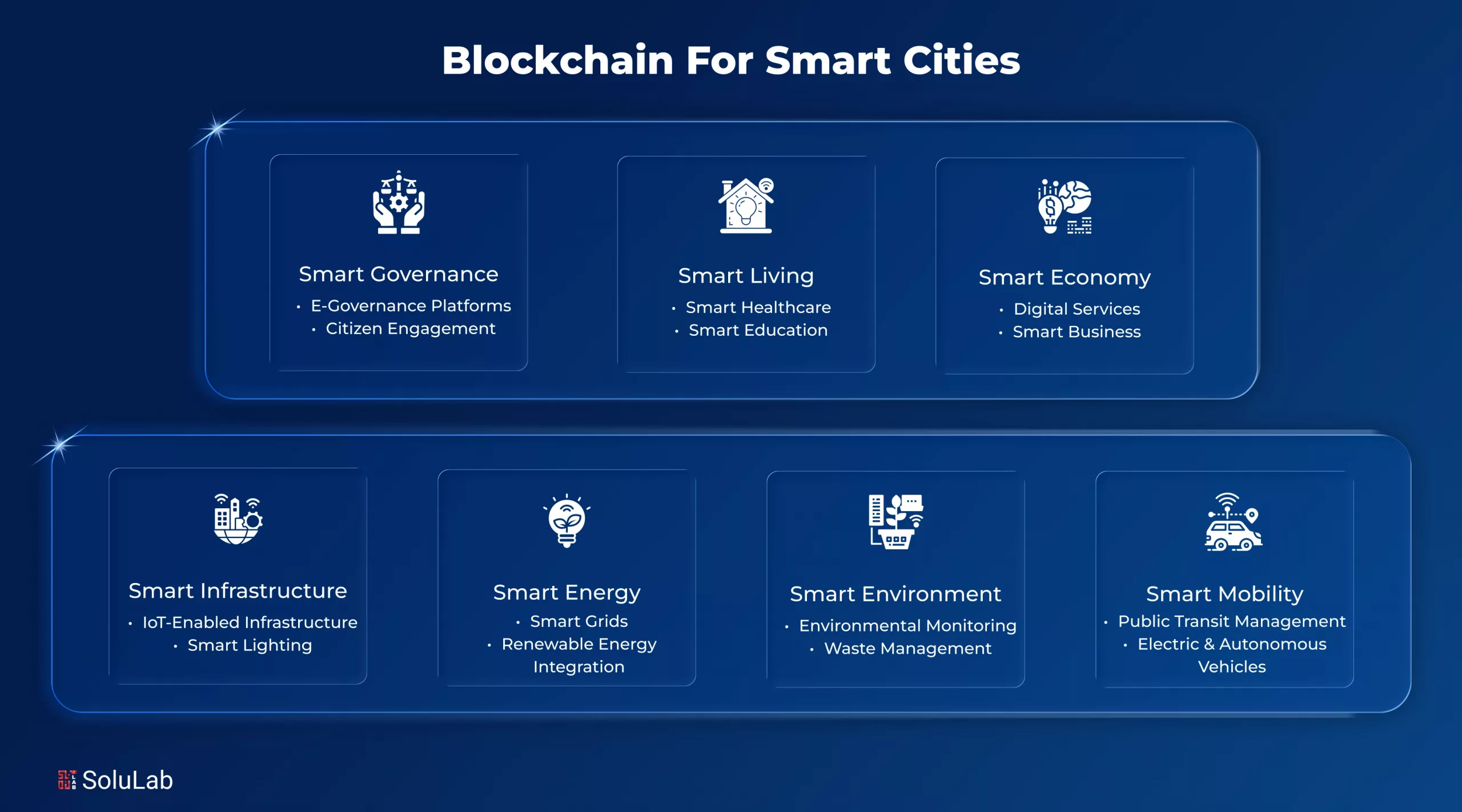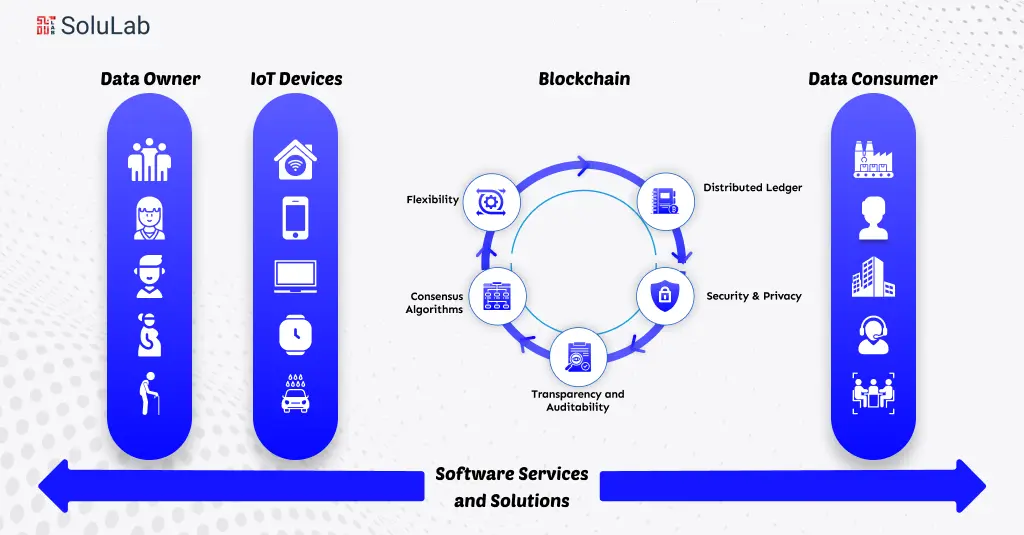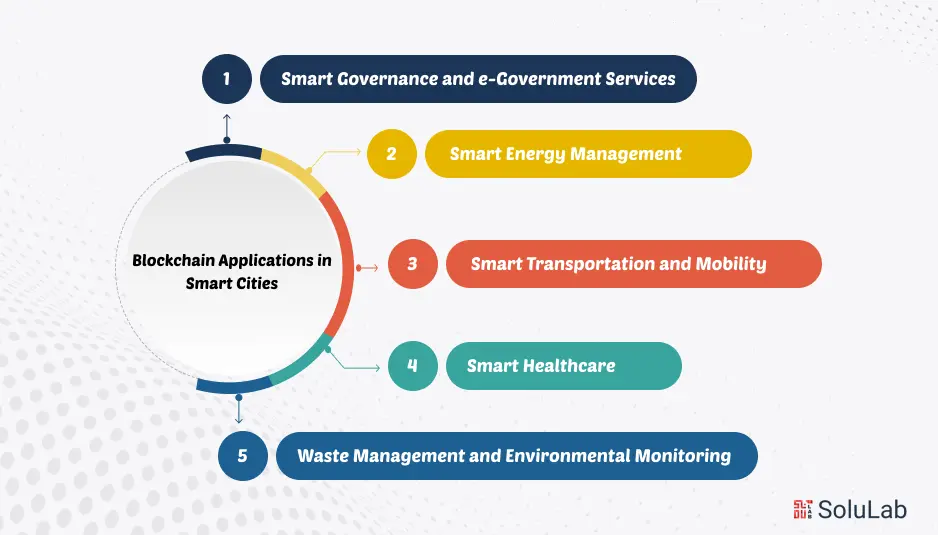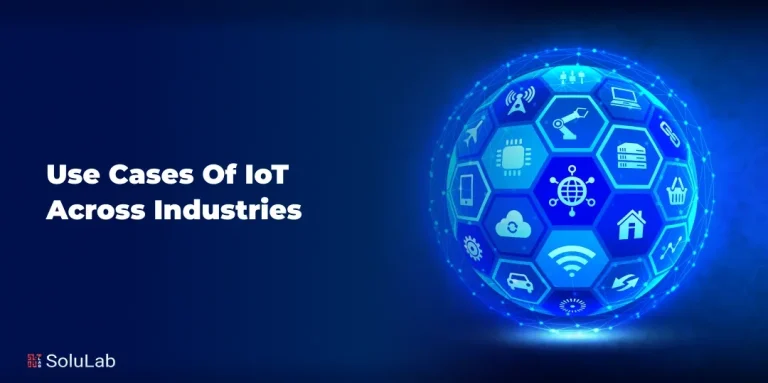
With the increasing population, the conventional urban systems have difficulties in providing efficient, transparent, and citizen-based services.
However, blockchain is changing smart cities by creating secure, transparent, and automated systems. It enables real-time data sharing, decentralized energy trading, fraud-proof transportation systems, and blockchain-based digital identities.
Governments can operate more efficiently, citizens gain trust and control, and urban services become faster, greener, and more reliable. By integrating blockchain with IoT, AI, and other technologies, cities are evolving into smarter, safer, and more sustainable environments for everyone.
In this blog, we’ll explore what smart cities and blockchain technology are, and how they work together.
Why Blockchain is Crucial for Smart Cities?
Blockchain for smart cities is changing how urban areas function. By increasing transparency, efficiency, and security, smart cities and blockchain together create sustainable, trustworthy, and people-focused environments.
- Increased Transparency and Connectivity: A Smart city with blockchain ensures that data is secure, traceable, and accessible. This fosters trust among citizens, governments, and organizations by enabling the sharing of real-time information without manipulation.
- Efficient Management: Blockchain technology for smart cities enables automation in key sectors such as traffic, utilities, and waste management. With reduced bureaucracy, smart cities save time and resources while providing smoother services to citizens.
- Integrity Over Information: Smart cities and blockchain ensure that critical information—such as citizen records, healthcare, or energy usage—remains tamper-proof. This enhances trust in governance and reduces risks of data breaches.
- Direct Communication: Smart city blockchain removes middlemen, enabling peer-to-peer communication. For example, citizens can directly pay for services without delays, reducing costs and ensuring faster transactions.
- Enhanced Security: Blockchain for smart cities strengthens cybersecurity. Decentralized records make it nearly impossible for hackers to alter sensitive data, protecting urban infrastructures from digital threats.
- Sustainable Urban Growth: By integrating blockchain and smart cities, governments can track energy use, water supply, and emissions more accurately, ensuring smarter environmental policies and sustainable city growth.
How Smart Cities Are Created With Blockchain?

A smart city involves special planning, research, and engagement with blockchain solutions. To begin with, one needs to do the following steps:
1. Research and Planning: Learn how blockchain could make cities smarter in areas like voting, transportation, energy, and garbage management. Develop a plan to implement blockchain technology to solve some of the problems.
2. Form Collaborations: To share information, resources, and experience, collaborate with blockchain developers, governmental bodies, higher education institutions, and the commercial sector.
3. Choosing the Appropriate Technology: When choosing the right blockchain technology to use, consider factors such as interoperability, scalability, and security.
4. Design a Pilot Project: To experiment with your ideas and demonstrate the potential of blockchain technology, begin with a small pilot project.
5. Engage the Community: Engage stakeholders and citizens in the development and implementation of blockchain solutions to ensure that their needs and concerns are addressed.
6. Measure and Evaluate: To understand the impact of the pilot project and identify the developmental opportunities, monitor it, and analyze it regularly.
Cities Leading the Way in Blockchain-Powered Smart Solutions
Smart cities like Singapore, Dubai, Austin, Barcelona, and Amsterdam are pioneering the use of blockchain to boost transparency, data sovereignty, digital identity, and citizen-centric services, redefining how cities serve people in a secure, efficient, and participatory way.
1. Singapore
Singapore’s Smart Nation programme integrates blockchain in government services, infrastructure, health, and logistics, aiming for data trust, interoperability, and citizen empowerment. The “Blockchain Solutions Singapore” cluster works on verifiable credentials, cross-border credentials, supply chain, and public service decentralization.
2. Dubai, UAE
Dubai’s Blockchain Strategy 2020 is committed to making government transactions paperless, secure, and fully powered by blockchain, increasing efficiency and reducing fraud. For example, DAMAC’s deal with MANTRA to tokenize real-estate assets shows real-world asset tokenization is being used to get value and liquidity in property.
3. Austin, USA
Austin has run the Mayor’s Blockchain Challenge, exploring blockchain solutions to store permanent digital identities and help people experiencing homelessness access services more reliably. The city is also open to Web3 and crypto payments, policies for digital identity, and using blockchain in supply chain, insurance, and public contracts.
4. Barcelona, Spain
The DECODE project (Decentralised Citizen-Owned Data Ecosystem) uses blockchain and cryptography to return control over personal and IoT data to citizens, letting them decide what is shared, with whom, and how.
5. Amsterdam, Netherlands
The Amsterdam Blockchain City / Amsterdam Economic Board initiative connects startups, universities, and government to push blockchain in mobility, energy, digital infrastructure, and ethical governance.
Key Applications of Blockchain in Smart Cities

Blockchain is transforming urban living by making cities smarter, safer, and more efficient. From governance to healthcare, blockchain applications in smart cities are reshaping how citizens and governments interact.
1. Smart Governance and e-Government Services
Blockchain brings transparency, accountability, and efficiency to governance. It enables secure voting, digital identity verification, and tamper-proof record-keeping, boosting blockchain and trust in a smart city for stronger citizen-government relationships.
2. Smart Energy Management
Blockchain supports peer-to-peer energy trading, renewable energy tracking, and fair billing systems. Ensuring transparency and efficiency makes energy distribution smarter, enabling blockchain-based smart city frameworks for sustainability.
3. Smart Transportation and Mobility
Blockchain enables secure ride-sharing, toll payments, and traffic data sharing. It ensures accurate tracking of vehicles and helps create efficient mobility networks, driving the vision of blockchain smart cities worldwide.
4. Smart Healthcare
Medical records stored on blockchain are secure, interoperable, and accessible only by authorized users. This helps reduce fraud, treatments, and strengthen healthcare reliability, a crucial blockchain smart city use case.
5. Waste Management and Environmental Monitoring
Blockchain tracks waste collection, recycling, and carbon emissions. It builds accountability among stakeholders and promotes sustainability, reflecting initiatives like blockchain smart city Dubai, which integrates green practices with advanced technologies.
Read more: How Go Supercharges Blockchain Development for High-Scale Enterprises?
Future of Blockchain in Smart Cities
Blockchain facilitates more efficient, transparent, and citizen-centric city systems. Some of the future trends are decentralized energy grids, secure digital identities, and automated public services, which will minimize bureaucracy.
Moreover, it will be better integrated with complementary technologies, such as IoT, AI, and cloud computing, to support real-time data gathering and decision-making, and guarantee privacy, resiliency, and trust.
- Decentralized Energy and Resource Management: P2P energy trading, smart water consumption monitoring, and waste disposal through trusted sensors will save money and decrease the environmental footprint.
- Secure, Interoperable Identity Governance Platforms: Public procurement. Self-sovereign digital identities and smart contracts will make the process more transparent and less corrupt.
- Scalability and Energy Efficiency Improvements: Future blockchain systems will be worked on to minimize latency, energy usage, and enhance throughput to meet the needs of urban scale.
- Embedded intelligence and predictive services: AI + blockchain pairs to predict failures in infrastructure, traffic flow optimization, emergency services, and so on.
Conclusion
Smart cities are being transformed by blockchain, making cities safer, more efficient, and more people-centered. The more cities are connected with blockchain and AI, the IoT, and other technologies, the more they become connected, sustainable, and resilient.
At SoluLab, we specialize in end-to-end blockchain development—from designing secure smart contracts and decentralized applications to integrating IoT, data analytics, and AI. We help city planners, governments, and enterprises build scalable, future-ready solutions that improve resource management, streamline operations, and enhance the quality of urban life.
Contact us to accelerate your smart city initiatives with secure, transparent, and innovative blockchain solutions!
FAQs
1. What is blockchain in smart cities?
Blockchain is a secure, decentralized digital ledger that records data and transactions, improving transparency, efficiency, and security in urban services.
2. How to implement blockchain in smart cities?
You can hire a blockchain developer and use blockchain consulting services to design secure, scalable, and efficient smart city solutions.
3. Is blockchain cost-effective for smart cities?
Over time, it reduces operational inefficiencies, fraud, and data management costs, providing long-term economic and social benefits.
4. Can blockchain support emergency services?
Yes, it improves coordination, predictive alerts, and faster responses in disaster management and public safety.
5. Is blockchain compatible with IoT and AI?
Yes, integrating blockchain with IoT and AI allows real-time monitoring, predictive services, and smarter urban decision-making.






